 Following huge success in the English speaking market, the Pontas Literary Agency has announced that The Almond Tree by first-time author Michelle Cohen Corasanti will now also be available in Spanish, Catalan, and Norwegian.
Following huge success in the English speaking market, the Pontas Literary Agency has announced that The Almond Tree by first-time author Michelle Cohen Corasanti will now also be available in Spanish, Catalan, and Norwegian.
Norwegian rights to The Almond Tree have just been acquired by Schibsted Forlag, the Norwegian publishers of well-known authors such as Khaled Hosseini, Kate Morton and Victoria Hislop. Editor Inger Marit Hansen said:
‘We have read The Almond Tree and we simply love it! It’s such a beautiful and strong story – and it made me cry several times. We will do our best to make sure that this beautiful novel gets all the readers it deserves.’
Shortly before the 2013 London Book Fair, world Spanish rights to the book were sold at auction to Ediciones B, one of the five largest Spanish language publishers, who also has a strong presence in Latin America. They will publish The Almond Tree under their literary imprint Bruguera, which publishes a range of renowned UK and US authors such as Lisa See and P. D. James. Carol París, Foreign Fiction Editor for Ediciones B, commented:
‘It has been a long time since a book struck me so hard. (…) It is an honest novel. There is no death or tragedy in it that leaves you indifferent or that comes across as sensationalist. (…) I felt captured from the first moment by her voice and her style. It is an honest story, exciting, with touching moments… It addresses a subject which is always present. A novel that shows pain, but also hope.’
Simultaneously, Catalan rights for The Almond Tree were sold to Amsterdam Llibres, an independently owned imprint of Ara Llibres. This imprint publishes a very varied list from literary to commercial, and includes Khaled Hosseini amongst its stable of successful authors. Commenting on the acquisition, Izaskun Arretxe, Editor and Director of Ara Llibres, said:
‘Last night I could hardly sleep. I am excited. From the first 50 pages I knew that I wanted topublish the novel in our Amsterdam imprint. (…) I really loved it, it had me gripped, it made me cry (more than laugh), it made me think and, in a way, it transformed me, which is what I ask most of in a book. Yes, yes, yes, we want to publish it!’
The Almond Tree is the story of a young Palestinian, Ichmad, who is gifted with a mind that continues to impress the elders in his village, and who struggles with the knowledge that he can do nothing to save his friends and family. Living on occupied land, his entire village operates in constant fear of losing their homes, jobs, and belongings. More importantly, they fear losing each other.
On Ichmad’s twelfth birthday, that fear becomes reality. With his father imprisoned, his family’s home and possessions confiscated, and his siblings quickly succumbing to hatred in the face of conflict, Ichmad begins an inspiring journey using his intellect to save his poor and dying family. In doing so he reclaims a love for others that was lost through a childhood rife with violence, and discovers a new hope for the future.
Since its publication in October 2012, the book has received glowing reviews both in the UK and the USA:
‘A story that grabs you from the first page and makes your heart go out to the Palestinians without pointing fingers at anyone.’Guillermo Fesser, Huffington Post.
‘The Almond Tree, intelligent, never over stated and written with love, informs and educates – it reminds us that there could be a better way to share this land and that if you allow intellect to blossom only good will come from it.’ Sam Hawksmoor, Hackwriters.
‘Corasanti’s accomplished debut novel offers a humanistic look into the Israeli-Palestinian conflict…Sensitive, moving and competently written; a complex novel as necessary as ever.’ ”Kirkus Reviews”.
‘With the onset of adulthood, one already must cope with so much. The Almond Tree follows the struggles of young Ichmad Hamid as his family is lost to strife, imprisonment, and everything they hold dear. The twelve year old learns it may be on him to use his limited talents to help his family and bring back something of a life. The Almond Tree is a strong addition to coming of age fiction collections, highly recommended.’The Midwest Book Review.
Pontas Literary agency reports that a number of other foreign editors are currently considering the novel, and they are confident that more foreign rights deals will follow. Pontas is also taking the project to next week’s Cannes Film Market, in the hope of attracting a film rights deal for the novel.

Michelle Cohen Corasanti is a Jewish American writer who has lived in France, Spain, Egypt and England, and spent seven years living in Israel. She currently lives in New York with her family.
For more information please visit www.garnetpublishing.co.uk/book/almond-tree





 The Knot in the Rug
The Knot in the Rug



